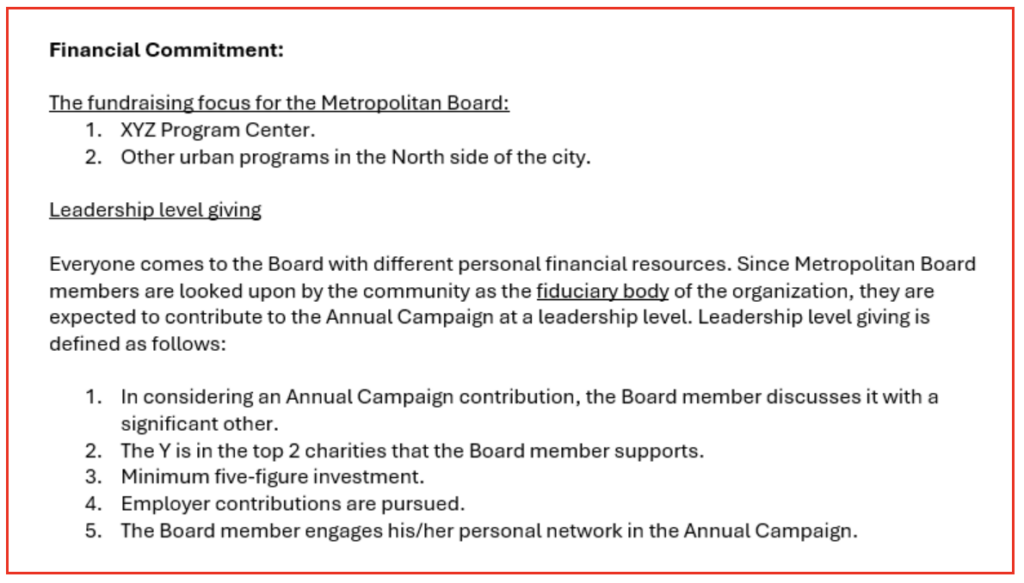
Leadership level giving for board members – who gets a pass?
Here is a question I often get (and one I had to deal with during my time as a nonprofit CEO): “Is it OK if my board members don’t give at a leadership level for annual campaigns?”
The answer is “no” unless there is an unusual exception. For capital campaigns, it is a bit more difficult to answer as the focus is on six-figure and higher gifts – but this depends on the size and type of the nonprofit organization, i.e., the larger organizations attract board members of higher wealth (think universities and hospitals as an example).
But getting back to the question about leadership-level giving for annual campaigns, it is important to first define leadership-level giving, which should be clearly outlined in the board member job description and discussed candidly during the prospective board candidate’s first meeting.
Here is an excerpt from a job description I have used for my boards:

Note item #1 under leadership-level giving – the significant other. This signals that the expectation is important enough to be a family decision.
In addition, the job description continues with some important metrics that the potential candidate can use to determine if he or she can keep pace with the current board in terms of personal giving:

Armed with this information, the potential board member can make an informed decision about whether he or she can make this type of commitment. It is important to note that your board development process should have already determined that the potential candidate has the financial wherewithal to qualify for the board.
Of course, the board development process also should include an evaluation of the individual’s time (can he or she attend meetings and events?), talent (does he or she have the type of expertise you are looking for and committee gaps to fill?) and other gaps need to be filled: geographic, diversity, corporate, personal network, business sector, etc.
It goes back to wanting a board member who can fulfill the time/talent/treasure requirement – you want a 100% board member, not a 67% (time and talent) board member!
The leadership-level requirement should be non-negotiable because the potential board member will be sitting at the same table with all the others. And your high-level donors will always ask, “What has your board given?”
But what do you do with a potential board member who has the time and talent but not the treasure? In this case, I would recommend getting the individual involved in a board committee if your bylaws allow non-board members to be committee members. This is where you can add important talent who want to help the organization move forward – just make it clear that it is mandatory to participate in the annual campaign at whatever level they can.
What if I am the new CEO and have inherited a board that was not recruited with the understanding that they are a fundraising board? This is sometimes a common situation and does need to be handled differently.
In my experience, it takes a process of working with the board (through the board chair) to create the revised job description requirements for new board members, while at the same time creating a realistic starting point for giving and getting for the existing board members.
This is best done by bringing in an independent party to work with the board through this process as it involves some difficult discussions. It is important to note that the current board members are not at fault as this issue was never a requirement (or discussed) when they joined the board. So, it is important to continue to affirm their worth!
What usually happens is that the board begins to agree that fund development is the fuel that funds the mission, and they start to understand that to do more good work and serve more people, they need to develop the board to the next level.
The bottom line of this is that it takes time and ongoing effort to work with your board to create a true culture of philanthropy. It starts with a comprehensive board development process and a job description that provides everything they need to know about how their role makes the magic of your organization’s mission happen.
ABOUT THE AUTHOR
![]()




